Summer Daze: Tilly’s Tale review – Light, sunny visual novel from Lori and Corey Cole not in the same class as Hero-U
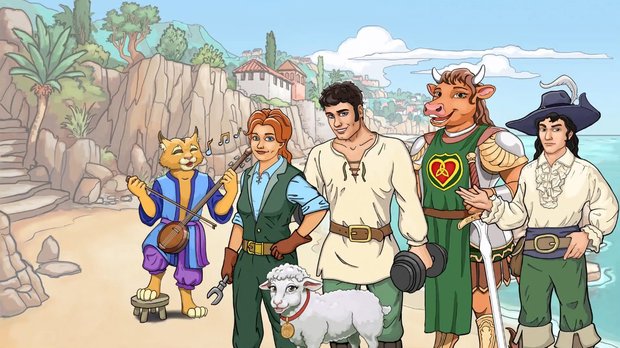
- 0 Comments
Five years ago, Lori and Corey Cole, creators of Sierra’s legendary Quest for Glory series, returned to adventure game design as Transolar Games with Hero-U: Rogue to Redemption, a school game-cum- RPG, which was hands down my favorite game from 2018. Summer Daze: Tilly’s Tale is a lighter and frothier spinoff, set once again in Hero University but with a whole new style of gameplay. It is as good-natured, insightful, and slightly silly as one would expect from the Coles, but unfortunately lacks any brain-teasing puzzles, or much challenge at all.
The Coles originally envisaged a series of games in the style of Rogue to Redemption, all set in the Hero-U world, but having lost money on the first game, they settled on a low-budget project for their follow-up instead: a fantasy adventure visual novel, “smaller and less complex,” as they put it in an interview in RPG Fan last year. While the Coles say it is “hard to consider committing to another large-scale game”, more class-based visual novels are expected to follow.
Like in Hero-U, you play a “Disbarred Bard” (read: Rogue) at Hero University named Tilly, a gamine half-Fae with a penchant for mischief. (Old-time QfG fans will be glad to know Tilly is the adopted daughter of the Healer of Spielburg, the shrewd, motherly lady who keeps kleptomaniac pterodactyls as pets.) Having dressed up a sheep as the Headmaster and loosed it onstage during school assembly, Tilly faces expulsion if she does not organize a successful Harvest Festival. She has only two weeks to do so, in between juggling class and navigating shoals of friendship and rivalry. Here’s where you come in. Sort of.
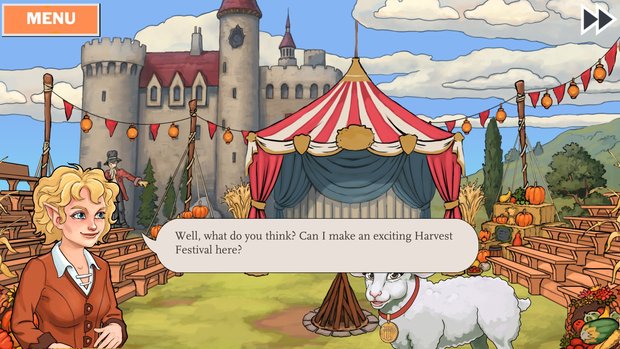
The gameplay of Tilly’s Tale feels like an illustrated Choose Your Own Adventure book rather than a full-fledged adventure/RPG hybrid like the Coles’ previous games, where you had the freedom to explore. Visual novels, the Coles explain, “strip out many of the more costly and time-consuming parts of creating the game,” offering “just as much character interaction but significantly reduced animation and background requirements.” As it turns out, however, “significantly reduced” really means “almost none.”
Like the Quest for Glory games and Hero-U, Tilly’s Tale takes place over a series of days. You have class each morning, and dinner in the evening; otherwise, you have the afternoon and night to visit parts of the university and talk to other students. You use an overhead map to navigate around the campus, and in every location you’re given a menu of options (four or five choices) of how to approach your quest. If there is another character there, should you try to con them into organizing the festival for you, or listen to them and make friends? With whom should you sit at dinner? At the end of the day, should you study for a test, prepare for the festival, or put your feet up?
The experience feels passive, though; it almost completes itself without you having to make any effort. (The closest the game comes to a puzzle is a minigame of cards.) As the Coles themselves admit: “There aren’t a lot of challenging – and arbitrary – adventure game puzzles, nor any CRPG-style combat.” There are many possible endings, including an unhappy outcome in which the festival is a flop and you are kicked out of school. But you would have to make a concerted effort to fail at this game. In the late stages, any friends Tilly has made and her teacher, Master von Urwald, will offer advice and even help to organize the festival.
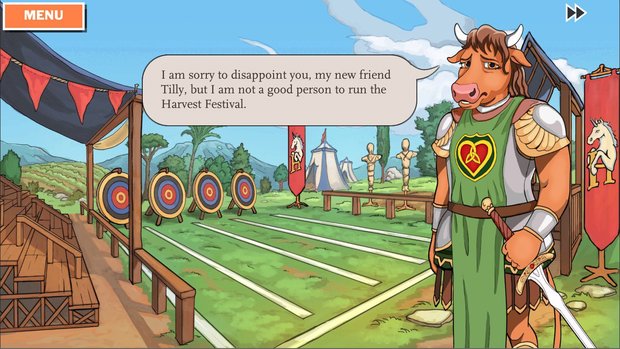
The first time I played, I finished the game in less than an hour, winning the “Best Fest” award (“Went above and beyond to decorate for the Festival, and ensured there would be good food and entertainment”). But Tilly did it singlehandedly, and I missed out on what makes the game tick: the interactions with other characters. Among others, the cast includes Fritz, the centaur wizard, Tilly’s friend from Spielburg; Mooella, the self-conscious minotaur paladin; and Sitari, the shy katta bard. There are three humans as well: Kitty, the scientist, who wants to build a flying machine; Max, the vain but lonely warrior; and Rodrigo, Tilly’s rival to be Rogue of the Year.
Some are good friends at first, while others are indifferent or hostile; a few are potential love interests. Each has an intriguing backstory, and different characters deal with prejudice (Mooella), misogyny (Kitty), self-doubt (Sitari), and familial expectations (Rodrigo and Max). Tilly helps them overcome their problems; helping other people has always been at the heart of the Coles’ games. The most bittersweet story is Fritz’s, which shows childhood friends taking different paths in life, accompanied by feelings of betrayal and eventual acceptance.
The characters are not animated but rather a series of still images – a handful for each character, depending on their current emotion. While the cartoon-style drawings are colorful and clear enough, they are less important than the dialogue, which, as always with the Coles, is irreverent and full of puns. Each character and every line is voiced by a professional actor, led by Zehra Fazal as a perky Tilly. Without rising to the heights of Quest for Glory IV (which was narrated by John Rhys-Davies, and featured a trio of Jack Nicholson impersonators), the diverse cast here do a perfectly adequate job: each voice feels appropriate to the character, and the accents (some assumed, some authentic) sound natural. (That said, voice acting in such a text-heavy game is a garnish; fast readers might prefer to turn it off.)
The game is meant to be played through multiple times, making different choices and forming new friendships to experience more of what the game has to offer. Through these friendships, you’ll learn more about Tilly: her compassion and zest for life, but also her self-centeredness and irresponsibility. Each playthrough brings out a different aspect of her personality.
Some branches unlock new locations: you can go monster hunting in the cellar and caves with Rodrigo (depicted offstage), or meet Fritz in the tower garden. But the game feels repetitious. Every day, Tilly attends Rogue class, and the disagreeable administrator, Mr. Terk, shouts at her after dinner. By the time one has sat through the same scenes on the third or fourth playthrough, ennui will have surely begun to set in. At least you can fast forward through every conversation, but in many cases it does not seem to make much difference what dialogue option you choose; the result is the same. The relationships deepen more through repeated conversations than through what you choose to say.
The game’s original release tended to freeze when moving to a new location. I was reminded of the dreaded “Bitten by a program bug” death from QfG I. It was frustrating to find that same loathsome insect (speaking figuratively) waving its feelers and scuttling through the halls of Hero University. “Save early, save often!” shouldn’t be the maxim for modern adventure games. Fortunately, the Coles know this too, and the issue now seems to have been fixed.
Final Verdict
Summer Daze: Tilly’s Tale is unlikely to daze (or Dazzle) players; it’s a minor work by the Coles. But while it isn’t nearly as ambitious as their previous games, it’s still an amusing trifle – a digestif after the lavish banquets of Quest for Glory and Hero-U. I enjoyed my time well enough in this universe once again, but perhaps the best thing about it is that it whets my appetite to play their earlier masterpieces once again while I wait for the next installment, Ifeyo’s Adventure, to arrive in a year or so.
Hot take
Summer Daze: Tilly’s Tale is a pleasant but undemanding little visual novel. Fans of Quest for Glory and Hero-U will enjoy spending time in the Coles’ universe again, but those who want the same kind of intricate gameplay might be disappointed.
Pros
- Skillful characterization
- Amusing, professionally voiced dialogue
- Bright, colorful drawings
Cons
- Easy to finish, with almost no challenge
- Short playtime and replays become increasingly repetitious
Nick played his own copy of Summer Daze: Tilly's Tale on PC.


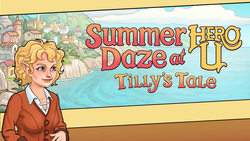

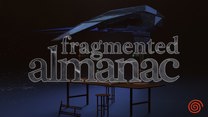






0 Comments
Want to join the discussion? Leave a comment as guest, sign in or register.
Leave a comment